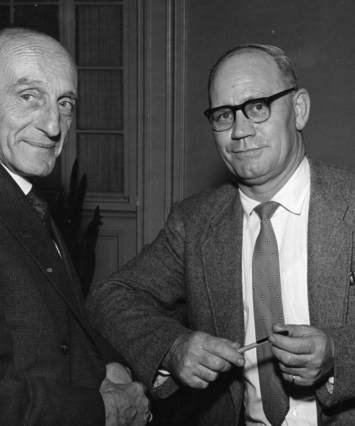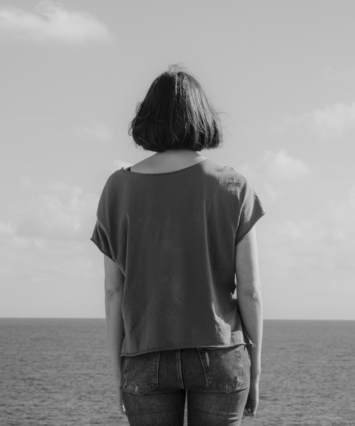During the troubled 1950s the bustling Port of Liverpool frequently came to a standstill. The dock gates would close and no ship could enter or leave the enclosed wharves. The port authority, the employers, and most of the dockers were equally puzzled as to how it was done. Few people noticed a man working on a barge at a strategic position on the waterfront. He was Joe Hancock, who 'unofficially' led the men who operated the dock-gates. And they would stay shut until he gave the nod.
He said later, ''We chose the issue, we chose the moment and nobody could do a thing about it.'' But, as he saw later, his strategy only hastened a disastrous loss of confidence, trade and jobs in the port.
On a day in 1960 Hancock met another Joe (Hodgson) who suggested that the traditional 'industrial battlefield' concept was out of date. Joe was scornful. But having read some evidence of his friend's ideas, he came to see a film by an Italian worker who used to write marching songs for Togliatti. lt was called 'The Light of Tomorrow', Hancock was silent after the film but a few nights later, round his fireside, he told us his story.
Joe never knew his parents. When he was seven, Dr. Barnardo's Homes sent him to Canada to work on a farm. He was harshly treated and at 16 he ran away. After 'riding the rods' looking for work, he crossed into the United States, when the Depression was at its worst. After some months of near- starvation, Joe joined the US Army. But when he came out things were just as bad.
He recalled standing in one breadline of 5,000 men.
On the West Coast he joined the Communist Party of California, then one of the largest in the US. In order to prove his rejection of the bourgeois values Hancock took part in a bank-raid, but was caught and served a sentence in San Quentin Gaol. He broke parole and after organising hotel and restaurant workers in New York, he was urged to volunteer for the Civil War in Spain.
He stowed away on the 'Queen Mary' and reached the assembly-point in Paris.
Hancock was already critical of Stalin's methods of getting rid of his critics. When he learnt how the political commissars often sent young recruits to their death on the front-line and used their passports to enable other agents to cross frontiers, he left the party in disgust. In Paris Joe was turned down, 'on medical grounds’. He came to Liverpool, linked up with a Trotskyite group, became a seaman and married a local girl.
Joe told us that after years of loneliness and struggle it was the first time he had fully experienced the love of another human being.
On one occasion when Joe came ashore after a voyage, a mate in a pub told him his wife had left him. It was not true. But at the time he believed it and was shattered.
Instead of going home he took a room in a small hotel. Most of the night he paced up and down. At one point he groaned, ‘God, what’ll I do?’ It was certainly not intended as a prayer. ‘But’ he told us, ‘a voice said "Give yourself to me" - twice. As a militant atheist, Joe was deeply shaken. During the next eight years he borrowed scores of books from public libraries, on psychology, comparative religion and philosophy, but found no satisfying explanation of his experience. ‘But last week,’ he said, ‘after the film I obeyed that voice and found peace in my heart for the first time in years.’
A few days later Hancock wrote resigning from the Trotskyite group he had belonged to. It crossed with a letter expelling him. He was given the full treatment in their paper.
They were angry to realise that for years Joe had been secretly searching for a radically different way to change society.
Hancock had a first-class, wide-ranging mind and was highly articulate. When he began to meet other people, often from very different backgrounds, who had experiences similar to his own, he quickly saw the significance for society. The basic ‘struggle' of ideas, he felt, was not between people, classes or races, but between good and evil inside the human personality. Only by winning such an inner struggle could the corruption of power and money in both Capitalist and Socialist ruling circles be cured and an unselfish society treated. The great need was to bring to the leadership of the nations a systematic training in a compelling moral ideology.
To this end this end in, 1962 he launched the ''Waterfront and Industrial Pioneer'' along with some trade union friends in Liverpool and London docks. The paper aimed to provide evidence that through a radical change in peoples' motives and policies, there was a new way of doing things in industry and a hope for world economy and society.
‘And,’ added Joe, ‘it will give expression to the great mass of inarticulate opinion that today find no voice, no expression’. Others kept the paper going since he died.
Today the 'Pioneer' reaches several thousand trade unionist, union officials, management, politicians and journalists in Britain and in 22 overseas countries.
Joe Hancock knew there was many another bitter, disillusioned revolutionary out there, who secretly longed for news of a realistic alternative to violence. ln his day, Joe helped some of them find it. ‘The Pioneer’ is pledged to run with his lighted torch.
English



